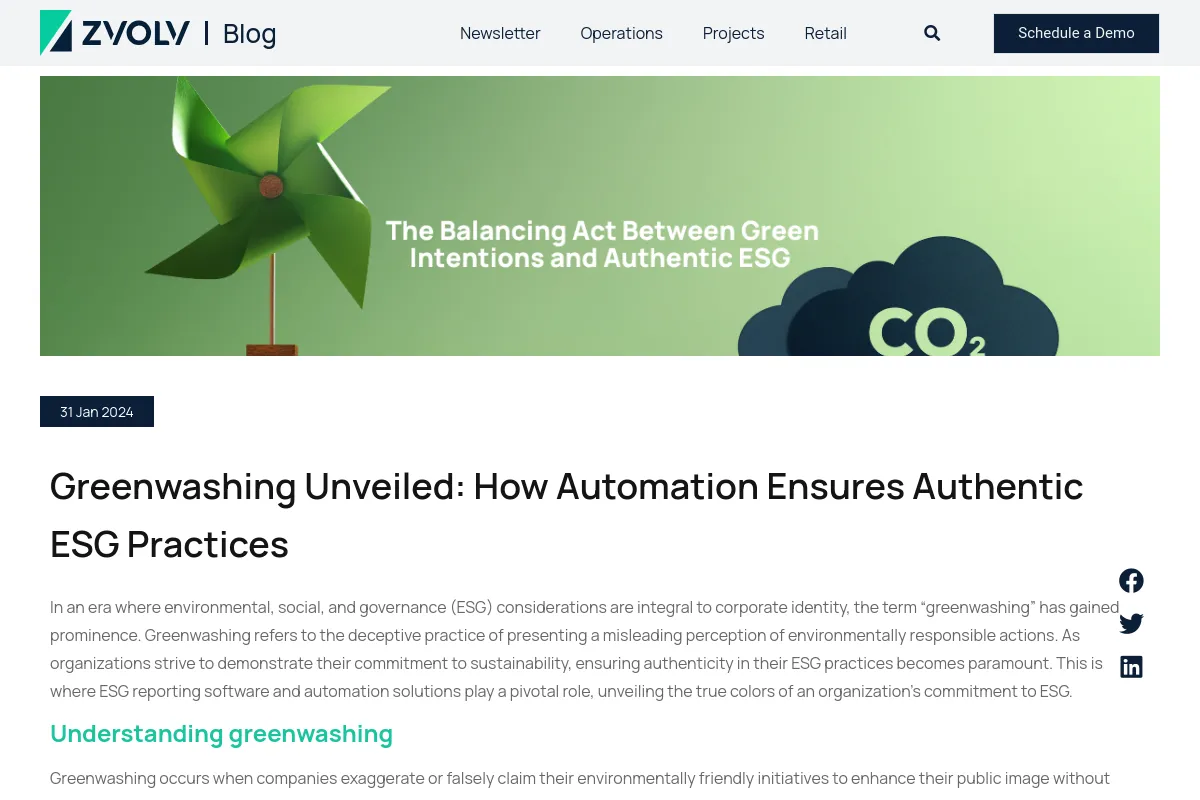Greenwashing Unveiled: How Automation Ensures Authentic ESG Practices
Blog: Zvolv Blog
In an era where environmental, social, and governance (ESG) considerations are integral to corporate identity, the term “greenwashing” has gained prominence. Greenwashing refers to the deceptive practice of presenting a misleading perception of environmentally responsible actions. As organizations strive to demonstrate their commitment to sustainability, ensuring authenticity in their ESG practices becomes paramount. This is where ESG reporting software and automation solutions play a pivotal role, unveiling the true colors of an organization’s commitment to ESG.
Understanding greenwashing
Greenwashing occurs when companies exaggerate or falsely claim their environmentally friendly initiatives to enhance their public image without making substantial changes. With consumers and investors increasingly valuing sustainability, the pressure on organizations to appear eco-friendly has intensified. However, this has also led to a rise in misleading marketing practices.
The role of automation in ESG transparency
Enterprises are turning to ESG reporting software and automation solutions to not only streamline their ESG management but also to eliminate the risk of greenwashing. Here’s how automation ensures authenticity in ESG practices:
Data accuracy and transparency:
ESG reporting software facilitates the accurate collection and reporting of ESG data. By automating the data gathering process, organizations reduce the chances of inaccuracies or manipulation, providing stakeholders with transparent and reliable information.
Real-Time Monitoring:
ESG reporting software enables real-time monitoring of ESG metrics. This ensures that organizations can quickly identify discrepancies between their stated sustainability goals and actual performance, minimizing the window for greenwashing practices.
Comprehensive Reporting:
Generate comprehensive ESG reports that cover various dimensions, from environmental impact to social responsibility. An ESG reporting software provides stakeholders with a holistic view of an organization’s sustainability efforts, leaving little room for selective disclosure.
Consistency Across Operations:
By automating ESG processes, organizations ensure consistency across different departments and operations. This uniformity reinforces genuine commitment to sustainability, making it harder for greenwashing to occur within specific segments of the business.
Audit Trail and Accountability:
ESG reporting software systems create a digital audit trail, documenting every step of the ESG reporting process. This not only enhances accountability but also acts as a deterrent for any attempts to manipulate or exaggerate sustainability achievements.
Overcoming greenwashing challenges
While automation plays a crucial role in combating greenwashing, organizations must also take proactive steps to address the root causes. Here are some recommendations:
Clear Communication:
Transparently communicate sustainability efforts, acknowledging both achievements and challenges. Authenticity in communication builds trust and helps dispel any suspicions of greenwashing.
Independent Verification:
Seek third-party verification for ESG reports. Independent audits provide an unbiased evaluation of an organization’s sustainability performance, offering stakeholders greater confidence in the disclosed information.
Continuous Improvement:
Embrace a culture of continuous improvement in ESG practices. Organizations that are genuinely committed to sustainability will evolve their strategies and initiatives over time, demonstrating a long-term dedication to positive change.
In the age of heightened ESG awareness, authenticity is the cornerstone of meaningful sustainability practices. ESG reporting software and automation solutions not only enhance the efficiency of ESG management but also act as a safeguard against greenwashing. By adopting automated systems, organizations can navigate the intricate landscape of ESG transparency, ensuring that their commitment to environmental, social, and governance responsibilities remains true and unblemished.
As the global community collectively moves towards a sustainable future, organizations leveraging automation in their ESG practices are not only safeguarding their reputation but contributing to a more transparent and responsible business ecosystem.
